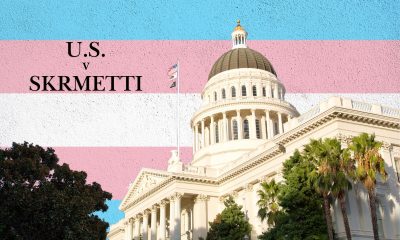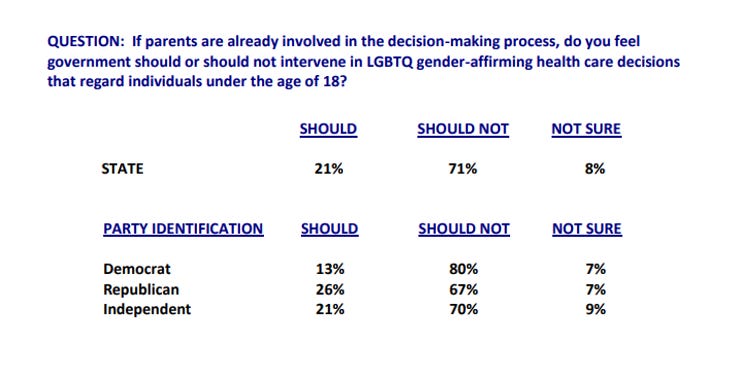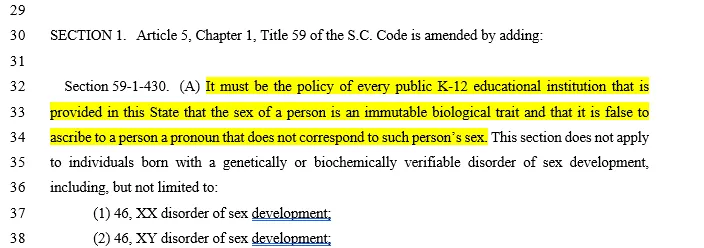South Carolina
South Carolina’s governor signs anti-Trans youth sports bill
“We must not play into fear or treat some of our most vulnerable community members – our transgender young people – like political pawns”
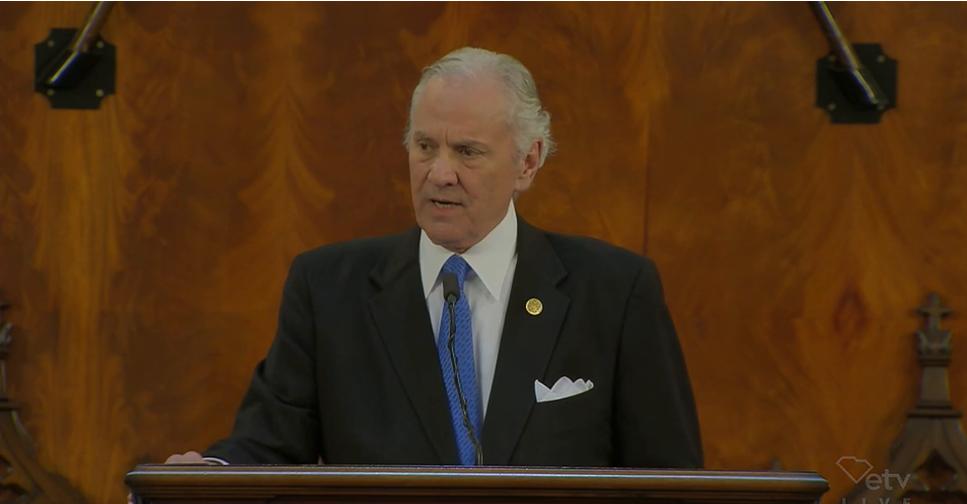
COLUMBIA – South Carolina’s Republican Governor Henry McMaster signed H.4608, the “Save Women’s Sports Act,” an anti-transgender bill that restricts trans students from participating in school sports that matches their gender identity in middle school, high school, and colleges across the state. All students will only be allowed to compete with the gender listed on their birth certificate.
The measure had passed its final legislative hurdle earlier this month and was forwarded to McMaster who signed it on Monday.
The passage of H.4608 comes after more than two years of LGBTQ+ and allied South Carolinians resisting similar efforts to ban transgender youth from sports participation. Between 2020 and 2021 advocates defeated 8 different versions of this bill, demonstrating consistent and powerful leadership from supporters of transgender dignity and equality. SC United for Justice & Equality is a coalition of more than 30 organizations committed to LGBTQ equality in SC that fought hard against the bill.
“It pains us to see lawmakers in South Carolina, and now the governor, ignore the voices of thousands of South Carolinians – including parents, medical providers, students, faith leaders, and transgender people ourselves – who expressed loudly and clearly that this bill will harm young people in our state. Transgender youth are not a threat to fairness in sports, and this law now needlessly stigmatizes young people who are simply trying to navigate their adolescence, make friends, and build skills like teamwork and leadership, winning and losing,” Ivy Hill, a leader in the coalition who serves as Executive Director of Gender Benders and Community Health Program Director of Campaign for Southern Equality, said in a statement.
“While extreme lawmakers ultimately forced through this anti-transgender attack, the SC United for Justice & Equality coalition is so proud of the ways that thousands of supporters of transgender dignity spoke out and organized against H.4608 and other bills this year. We are grateful for every South Carolinian who expressed their love, support, and respect for transgender youth and rejected these politics of division and cruelty. Despite this setback, we will never stop fighting on behalf of trans and queer young people, and our coalition will explore every strategy possible to surmount every barrier to equality,” Hill added.
Dr. Elizabeth Mack, a board certified pediatric critical care physician and pediatrician in Charleston, SC, has been one of many medical providers who has worked against the bill. When the bill passed in the Senate, she said:
“As a born and raised South Carolinian, it is my expectation that our state’s elected officials make decisions based on evidence and listen to our state’s experts. We must not play into fear or treat some of our most vulnerable community members – our transgender young people – like political pawns. Transgender youth face higher rates of bullying, mental health issues, and even suicide than their non-transgender peers, which we sadly see routinely in pediatric ICUs. This bill tells a population that is already at risk, ‘We do not support you,’ and I am devastated to see it pass. We must protect our future – our young people.”
A 2019 report from the Campaign for Southern Equality found that more than half of LGBTQ+ people in SC reported experiencing depression (71%) and anxiety (63%) – and rates were even higher for trans individuals and those who are BIPOC.
“Every day, The Trevor Project’s crisis counselors hear from young transgender and nonbinary people who want nothing more than to be honest about who they are and have the same opportunities as their peers. Like every one of the sports bans we’ve seen passed across the country over the last three years, this is a solution in search of a problem, and it will only work to increase the isolation and stigmatization of an already-marginalized group of students,” said Sam Ames, Director for Advocacy and Government Affairs at The Trevor Project. “Our 2022 national survey finds that nearly 1 in 5 trans and nonbinary youth attempted suicide in the past year — and this elevated risk is not due to their gender identity, but rather because of how they are mistreated. It’s heartbreaking to know that trans youth, who already report the highest rates of anxiety and depression symptoms, now have one more thing to worry about. We implore lawmakers to stop these unfair and unnecessary policies targeting a small group of marginalized youth, and focus their energy on the well-being of all youth.”
The Trevor Project’s new national survey also found that 71% of transgender and nonbinary youth reported that they have experienced discrimination based on their gender identity, and those who have reported significantly higher rates of attempting suicide in the past year compared to those who have not. However, research also shows that transgender and nonbinary youth who had access to gender-affirming schools report lower rates of attempting suicide.
Recent polling conducted by Morning Consult on behalf of The Trevor Project, 85% of transgender and nonbinary youth say recent debates about state laws restricting the rights of transgender people have negatively impacted their mental health. When asked about new policies that would ban transgender girls from playing on girls’ sports teams and transgender boys from playing on boys’ sports teams, 74% of transgender and nonbinary youth said it made them feel angry, 57% felt sad, 43% felt stressed, and nearly 1 in 3 felt scared.
A 2021 peer-reviewed study by The Trevor Project’s researchers, published in Transgender Health, also found that transgender and nonbinary youth who reported gender identity acceptance from adults and peers had significantly lower odds of attempting suicide in the past year. The Trevor Project’s research has also found that a majority of LGBTQ young people (68%) have never participated in sports for a school or community league or club — with many citing fear of bullying and discrimination as a key factor for not participating.
South Carolina
SC governor to sign bill banning HRT for trans youth into law
Treatments for youth already taking the drugs can be gradually taken off them through Jan. 31 of 2025 according to the new law as enacted
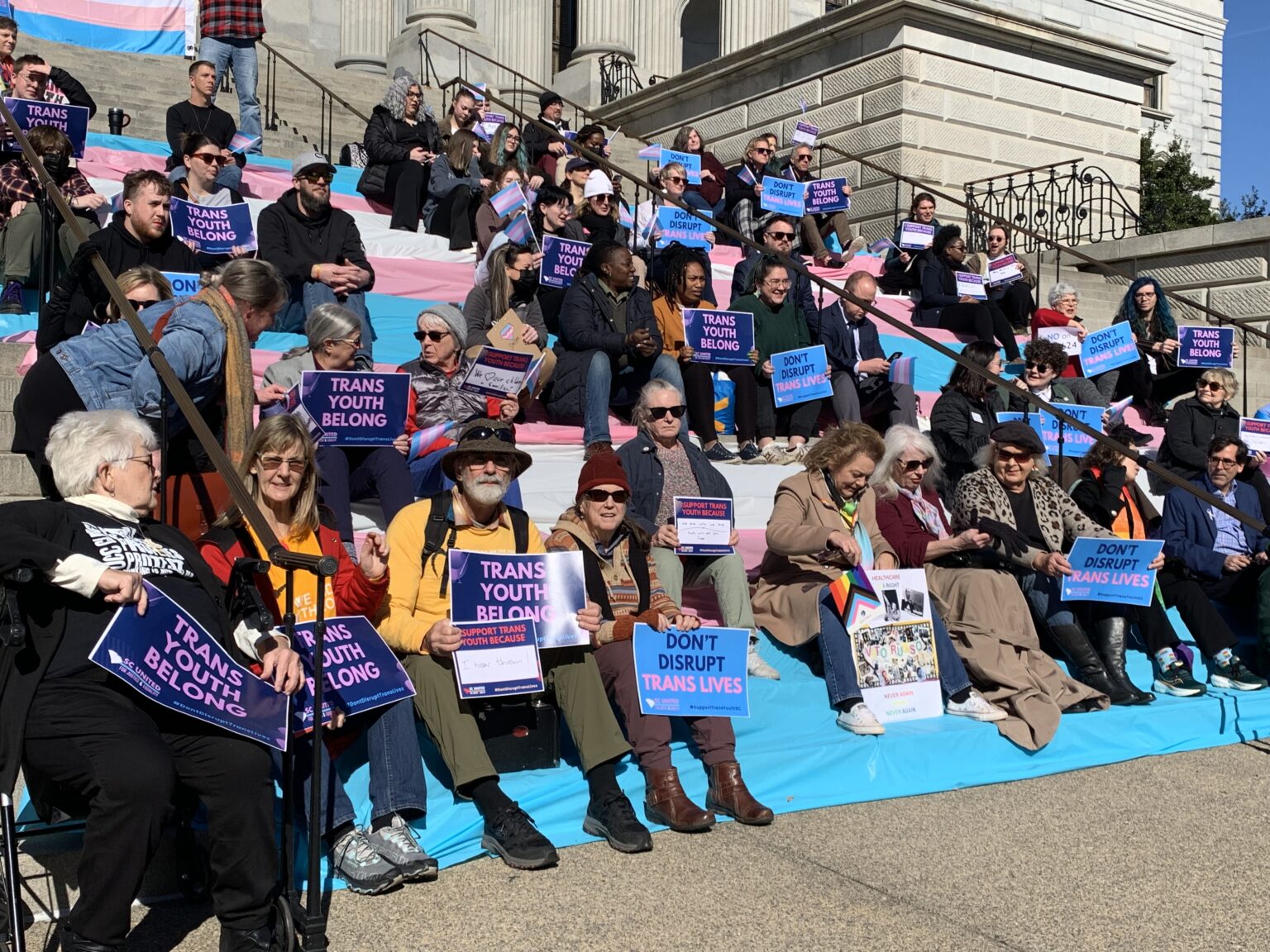
By Skylar Laird | COLUMBIA, S.C. — A bill banning transitioning medications and surgeries for transgender children is set to become law after the House agreed Thursday to accept the Senate’s changes.
Gov. Henry McMaster plans to sign the bill into law, a spokesman confirmed shortly after the House voted 67-26 along party lines to send it to his desk.
“I think this is a good idea to keep our young people safe and healthy,” McMaster told reporters in January. “If they want to make those decisions later when they’re adults, then that’s a different story, but we must protect our young people from irreversible decisions.”
The bill would ban doctors from prescribing puberty blockers or gender-transitioning hormone therapy to transgender youth under the age of 18. Doctors or other health care providers who violate the ban would risk losing their license. A complaint would have to be filed with the provider’s licensing board within three years of the treatment.
Also disallowed are gender-transition surgeries, though both sides agree no doctors are performing such surgeries on minors in South Carolina. If they ever do, they’d risk being convicted of a felony punishable by up to 20 years in prison.
The Senate added a provision requiring school administrators to notify students’ parents when children ask to change their pronouns or say they’re a different gender. The House accepted that without debate.
South Carolina will join two dozen other states with similar bans, though some are blocked by court challenges.
Supporters of the bill have touted it as protecting children from what they say can be dangerous and irreversible surgeries and treatments. House Republicans listed the measure among their top priorities for the year, and the House passed it within the first week of session.
Opponents have said the bill will throw families into disarray and put transgender children at a higher risk of suicide. Democrats in both chambers also argued the state shouldn’t come in the middle of medical decisions that should be between a family and their doctor.
The bill will take effect with McMaster’s signature.
However, it allows a phase-out for youth already in treatment.
Any minor taking puberty-blocking drugs or so-called “cross-sex” hormones under a doctor’s care before Aug. 1 can be gradually taken off them. All prescriptions must cease by Jan. 31, 2025.
Families of transgender children whose access will end can apply to get the treatment in a different state through the Southern Trans Youth Emergency Project, the Campaign for Southern Equality announced Thursday. That can include up to $500 to cover travel and other expenses, according to the nonprofit.
“No one should be forced to leave their home state to access the care that they need and deserve,” Raymond Velazquez, executive director of partner organization Uplift Outreach Center, said in a statement. “Through this program, we will ensure that families and young people understand that they have options – and that support is available to help them.”
******************************************************************************************

Skylar Laird covers the South Carolina Legislature and criminal justice issues. Originally from Missouri, she previously worked for The Post and Courier’s Columbia bureau.
******************************************************************************************
The preceding article was previously published by the South Carolina Daily Gazette and is republished with permission.
The South Carolina Daily Gazette is a nonprofit news site providing nonpartisan reporting and thoughtful commentary. We strive to shine a light on state government and how political decisions affect people across the Palmetto State. We do that with coverage that’s free to both readers and other news outlets.
We’re part of States Newsroom, the nation’s largest state-focused nonprofit news organization.
South Carolina
South Carolina ignores federal court, Senate bans trans care
Republicans rejected multiple amendments designed to make the bill less harmful towards trans people- the bill then ultimately passed 27-8
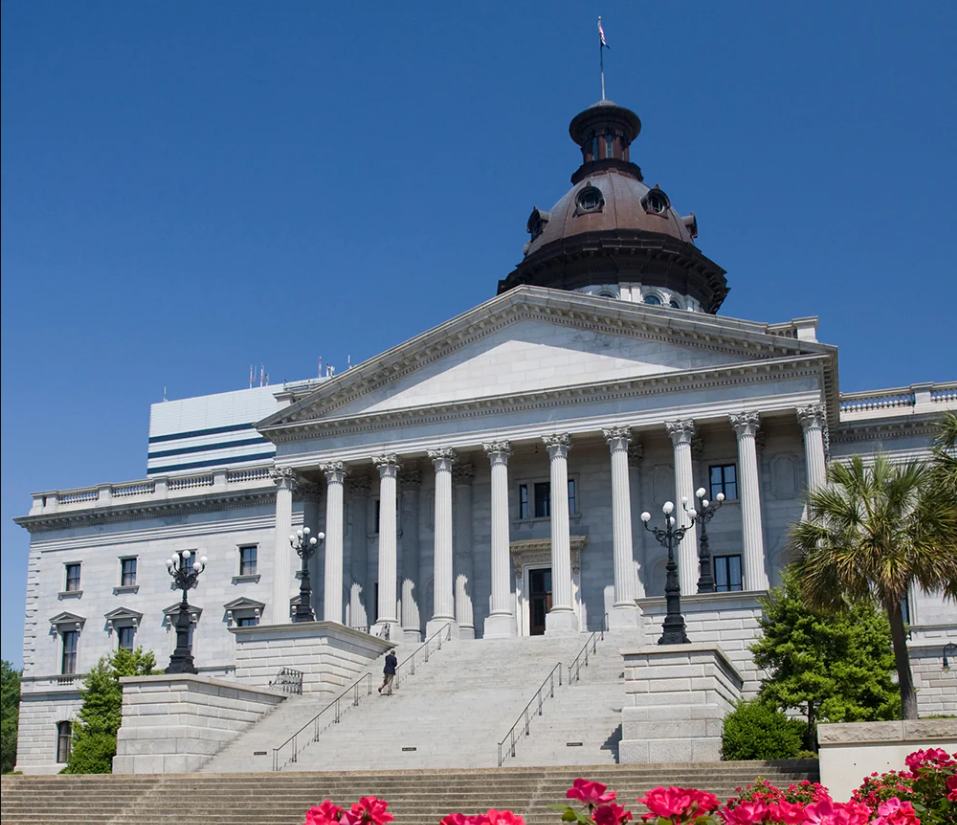
By Erin Reed | COLUMBIA, S.C. – Days after a landmark ruling in the 4th U.S. Circuit Court of Appeals that found medical discrimination against transgender people unconstitutional, the South Carolina Senate passed a broad gender-affirming care ban.
The bill, House Bill 4624, prohibits gender-affirming care for transgender youth and also targets mental health providers. It forces teachers to out transgender students to their parents. It also includes an expansive public funding ban, prohibiting the use of public funds “directly or indirectly” for gender-affirming care at any age, potentially affecting the availability of all transgender care in the state.
By doing so, South Carolina appears to be ignoring a ruling from the very court circuit in which it is located, just days after the decision was issued.
The bill states that “A physician, mental health provider, or other health care professional shall not knowingly provide gender transition procedures to a person under eighteen years of age.” The mental health provider portion of the bill was a heavy point of contention, with the ACLU of South Carolina interpreting it to cover at least some counseling for gender dysphoria. Though a later amendment was added that says it would not “impose liability on any speech protected by federal or state law,” the vagueness of the bill means that mental health providers who give out of state treatment locations to the families of transgender youth may still be targeted.
The bill also includes an extremely broad prohibition on public funding for gender-affirming care. It specifies that “public funds may not be used directly or indirectly” for such care, regardless of the recipient’s age. This would eliminate Medicaid coverage, prohibit gender-affirming care under the state employee health insurance plan, and could potentially target any doctor or hospital that receives public funding. Notably, “indirectly” funding gender-affirming care could mean that any doctor providing such care might see state grants jeopardized. Such actions have already been taken against the Medical University of South Carolina, whose funding was threatened unless it ceased all transgender care in 2023. The hospital discontinued care for all transgender youth shortly thereafter. This provision, along with much of the bill, appears to come from the Family Policy Alliance’s model legislation, although it goes further than that model legislation in applying the ban to any age.
You can see the portion of the bill barring public funding as well as Medicaid coverage here:
The bill seems to both directly and indirectly disregard a recent decision by the 4th U.S. Circuit Court of Appeals, to which South Carolina belongs. In that decision, a Medicaid ban on transgender care in West Virginia and a public employee health care policy ban in North Carolina were deemed unconstitutional. The court determined that gender identity is a protected characteristic and that medical discrimination infringes upon the equal protection rights of transgender individuals. Similarly, it ruled that Medicaid bans contravene both the Affordable Care Act and the Medicaid Act.
This point was emphasized repeatedly, including during a speech by Democratic Senator Tameika Isaac Devine, who observed, “Just earlier this week, the 4th Circuit, which includes South Carolina, ruled that North Carolina’s state healthcare plan must pay for gender-affirming surgeries… The 4th Circuit found that North Carolina’s law violates Equal Protection… This is the second ruling in favor of trans rights from the same 4th Circuit just this month. Last week during the discussion of bathrooms, I brought it up and it was disregarded.”
Republicans rejected multiple amendments designed to make the bill less harmful towards transgender people. One rejected amendment would have banned conversion therapy. Another rejected amendment would have allowed for “reversible” treatments. An amendment adding speech protections to mental health providers was adopted, but the nature of those protections are likely to be seen as vague in the context of the bill.
The bill then ultimately passed 27-8, with all Republicans voting for the bill and disregarding the 4th Circuit decision on transgender care. Following the bill, Executive Director of the ACLU’s South Carolina branch Jace Woodrum stated, “I’m heartbroken. I imagine so many of you who have been in this fight with us are heartbroken too… I know in moments like this it may feel like nothing we do matters, but it does. We showed South Carolina that transgender kids do matter, and we’re going to keep fighting for them. I hope that you’ll continue to fight with us.”
The bill will return to the House for concurrence with the changes made. If the House concurs, it will proceed to the governor’s desk, where it will take effect upon the governor’s signature.
****************************************************************************

Erin Reed is a transgender woman (she/her pronouns) and researcher who tracks anti-LGBTQ+ legislation around the world and helps people become better advocates for their queer family, friends, colleagues, and community. Reed also is a social media consultant and public speaker.
******************************************************************************************
The preceding article was first published at Erin In The Morning and is republished with permission.
South Carolina
SC Senate, K-12 bill mandates ‘a boy will use the boys’ bathroom’
The requirement was inserted into the S.C. Senate’s $13.8B spending plan, despite expectations of a lawsuit

By Skylar Laird | COLUMBIA, S.C. — Students in South Carolina’s K-12 schools would need to use bathrooms and locker rooms corresponding to their biological sex at birth under a rule senators inserted into their state budget package.
The proposal approved by senators 30-7 on party lines late Wednesday applies to multi-stalled school restrooms and places where students undress, to include locker rooms and gym showers. It also specifies that during overnight school trips, students of different genders can’t sleep in the same room or use the same multi-occupancy bathroom — unless they’re siblings.
All 30 of the Senate’s Republicans voted for it. Some Democrats didn’t vote.
The vote came a day after state Superintendent Ellen Weaver sent a letter to district superintendents and school board members statewide recommending that they disregard new federal regulations expanding sex discrimination protections in Title IX to include sexual orientation and gender identity. The federal rules are supposed to take effect Aug. 1.

Sen. Wes Climer, R-Rock Hill, acknowledged taking “a bit of a U-turn” in offering completely different state rules for public schools.
“I don’t have any particular delight in standing here discussing this. In fact, I find it baffling, insane that we’re even having this conversation,” he said after taking the podium to explain his proposal.
This “stipulates in school settings that a boy will use the boys’ bathroom, the boys’ locker room, the boys’ changing room, and a girl will use the girls’ bathroom, the girls’ locker room, the girls’ changing room,” he said.
The proposal, he said, is in response to an 18-year-old senior at Rock Hill High who’s daily using the women’s locker room. Climer didn’t elaborate, and a spokesperson for the school district did not immediately respond to requests from the SC Daily Gazette for comment.
Under his proposal, districts that violate the rule risk up to 25% of their state funding.
Technically, the budget clause is not an all-out ban. Rather, it bars school districts from using any state taxes to maintain facilities or pay for trips in violation of the rule. However, since revenue sources for school operations generally all go into the same pot of money, it’s effectively a ban, as Republicans intend it to be. It’s written that way because state budget clauses must pertain to budget allocations.
A court fight?
Sen. Tameika Isaac Devine, D-Columbia, tried unsuccessfully to get Climer’s amendment thrown out as not germane to the budget. She also argued it incorrectly attempts to change state law that declares it illegal to discriminate based on sex or in ways “degrading to human dignity.” But she was overruled.
“We know that this amendment will be a violation of constitutional law, and we could be sued. The state could be sued,” Devine said. “I think we are willfully ignoring that to play to people’s fears.”
She pointed to a 2015 federal lawsuit in which a transgender student in Virginia successfully sued the local school board for not allowing him to use the men’s bathroom or locker room.
A federal appeals court agreed with the lower court’s ruling requiring the school board to allow him to use the facilities of his choice. And the Supreme Court in 2021 decided not to hear the case, allowing that decision to stand.
Climer acknowledged a lawsuit is likely, and the same district court that ruled on Virginia’s case may rule the same way.
But he thinks the U.S. Supreme Court would take the case this time, especially since more states are adopting similar rules, so justices could be settling multiple cases.
Regardless, “it was the right thing to do,” he told the Gazette.
“It’s unconscionable that an 18-year-old man is in locker rooms with 14-year-old girls,” he said.
Sen. Deon Tedder, D-Charleston, said if the transgender female student Climer’s referring to has undergone hormone replacement therapy to have more feminine attributes, using the men’s room might be inappropriate.
“If that person was born a male and has physically transitioned and is no longer a male, by voting for this we’d be sending a female into the male’s locker room now,” Tedder said.
His arguments will likely come back next week.
Before adjourning Thursday, senators voted to put a bill banning gender-transitioning surgeries and hormones for transgender youth under 18 on priority debate status. Opponents have repeatedly said no such surgeries are happening in South Carolina.
Ten states require students to use the bathroom of the sex they were assigned at birth, according to Movement Advancement Project, an LGBTQ advocacy group.
That points to a changing climate from the days when North Carolina adopted a similar law, known as the bathroom bill, in 2016, causing nationwide uproar and losing the state major business deals. State lawmakers ultimately undid that law in 2017.
Back then, South Carolina lawmakers rejected a similar proposal from a GOP senator, with then-Gov. Nikki Haley calling it unnecessary.
“That ship has sailed,” Climer said.
Jace Woodrum, director of the American Civil Liberties Union of South Carolina, called Wednesday’s late-night approval of a budget clause a way to “sneak an unpopular policy” into state law.
“Right now, in South Carolina, it isn’t easy to be a transgender kid,” Woodrum said in a statement to the SC Daily Gazette. “Transgender kids are often bullied, called incorrect names, left out of sports and activities, and made to use restrooms and locker rooms that put their safety at risk.
“Instead of trying to make schools safer and fairer for all students, South Carolina lawmakers are bullying transgender students,” he continued. “They need to get their priorities in order.”
The bathroom requirement was one of many education-related clauses senators added to the budget before voting late Wednesday to send the amended, $13.8 billion spending plans back to the House.
They included one letting students from small private schools try out for public school sports teams, mirroring a bill advanced by the Senate Education Committee. With just six legislative days left in the regular session, that’s among bills running out of time to make it through the process. Putting it in the state budget makes it a one-year law. The proposal would allow students using state-funded scholarships for private school tuition continue playing on a sports team not offered at their new school.
Spending differences
Senators debated for two full days on the budget advanced by the Senate Finance Committee, mostly on policy. Very little of the floor debate involved dollar figures.
A final budget for the fiscal year starting July 1 is still weeks away. The House will get another chance to tweak its plan before the two versions go to a six-member committee of House and Senate members to hash out the differences.
One major distinction between the two proposals is how to spend $600 million in surplus sales tax collections that have built up since 2020 in an account for property tax relief. Gov. Henry McMaster recommended lawmakers put it toward fixing bridges.
The Senate plan would put $100 million toward accelerating an income tax cut. The rest would go to road and bridge projects, aside from $53 million set aside for the University of South Carolina’s new medical campus.
The House had proposed spending $500 million on a one-time property tax relief, averaging $359 per homeowner.
Senators also agreed upon higher raises for state employees than the House passed in its budget. The Senate budget would give all employees making less than $50,000 a $1,375 raise, with everyone else getting a 2.75% boost.
The House plan had recommended a $1,000 raise to anyone making $66,667 or less and a 1.5% raise to employees making more.
Both chambers agreed on raising first-time teachers’ pay to $47,000 minimum in the coming year, up from $42,500. They also agreed on a minimum salary schedule, giving teachers annual increases for experience through 28 years in the classroom. That’s one part of the budget now guaranteed. With both chambers in agreement, those teacher pay raises are now locked in as final.
******************************************************************************************

Skylar Laird covers the South Carolina Legislature and criminal justice issues. Originally from Missouri, she previously worked for The Post and Courier’s Columbia bureau.
******************************************************************************************
The preceding article was previously published by the South Carolina Daily Gazette and is republished with permission.
The South Carolina Daily Gazette is a nonprofit news site providing nonpartisan reporting and thoughtful commentary. We strive to shine a light on state government and how political decisions affect people across the Palmetto State. We do that with coverage that’s free to both readers and other news outlets.
We’re part of States Newsroom, the nation’s largest state-focused nonprofit news organization.
South Carolina
New SC Poll: 71% say state should not intrude in trans youth care
In a major poll 71% of South Carolina voters, including a majority of Republicans, believe the government should stay out of trans youth care
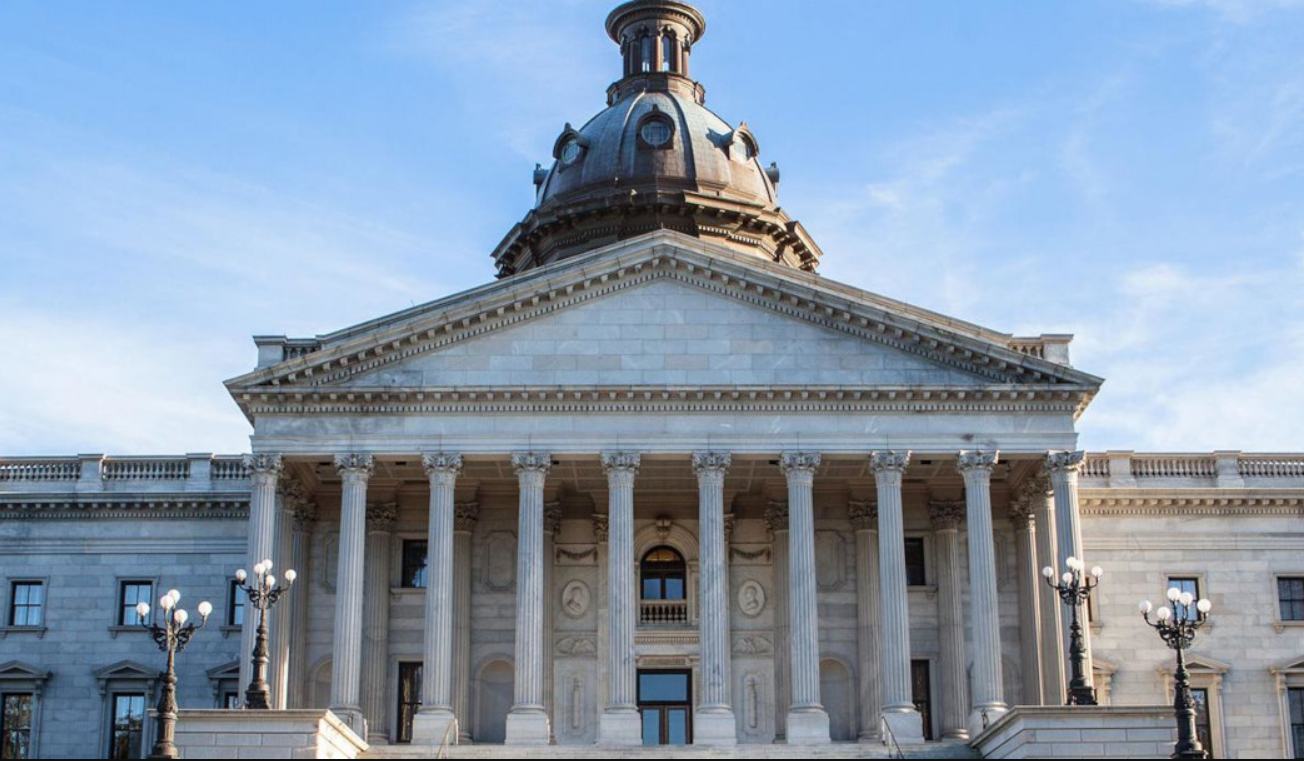
By Erin Reed | COLUMBIA, S.C. – A new poll conducted by Mason Dixon Polling & Strategy among registered voters in South Carolina has revealed that an overwhelming majority believes the government should not intervene in medical decisions regarding gender-affirming care for transgender youth, provided parents are involved in those decisions.
Even a majority of Republicans oppose government intervention in the new poll. These findings are noteworthy given South Carolina’s heavily Republican legislature and its tendency to vote predominantly for Republicans in national elections. With this new poll, a clearer picture is emerging regarding the general public’s perception of bills targeting trans youth; South Carolina could enact such a bill imminently.
The poll, surveying registered voters in South Carolina, posed the question: “If parents are already involved in the decision-making process, do you believe the government should or should not intervene in LGBTQ gender-affirming health care decisions concerning individuals under the age of 18?”
It found that 71% of the state’s registered voters believe the government should not intervene in such gender-affirming health care decisions. Opposition to government intervention was substantial across all political affiliations: 67% of Republicans, 70% of independents, and 80% of Democrats were opposed.
You can see the results here:
South Carolina remains one of the few Republican-controlled states that has not enacted a ban on gender-affirming care for transgender youth. House Bill 4624, currently under consideration by state legislatures, seeks to prohibit such care for transgender youth, mandate that teachers disclose transgender students’ identities, and deny Medicaid coverage for gender-affirming procedures up to the age of 26 years old, marking a significant intrusion into the care of adult transgender individuals.
The debate surrounding this bill has been intense, highlighted by a senior legislator’s claim that “young people” are using litter boxes in classrooms, “identifying as cats,” and “answering yes or no with a meow.” These assertions have been consistently debunked as a hoax spread by extremist accounts, including Libs of TikTok.
The latest poll aligns with other recent surveys in primarily Republican states and national polls, offering a nuanced perspective on the general public’s views on transgender care. While some polls have been published indicating opposition to transgender care for youth, others suggest a lack of strong feelings on the issue, with it not being a high priority for most people.
For example, only 1% of respondents in a Fox News poll identified trans/woke issues as a top policy priority.
The picture becomes significantly clearer, though, when it comes to government intervention into care that a parent approves of. According to a recent Data For Progress poll, 76% of participants believe decisions regarding transgender care for youth should be made by parents or doctors.
In Kentucky, 71% opposed a law that would permit the state to override parents’ decisions to secure gender-affirming care for their transgender teenagers. A Grinnell College poll similarly revealed that a significant majority opposes bans on transgender care with parental consent.
Additionally, a Pathfinder poll last month found that a majority of voters would be motivated to oppose political candidates who frequently discuss restricting access to healthcare and sports for transgender youth.
The notion that the general public disapproves of anti-trans legislation is further supported by electoral outcomes where transgender issues have been a focal point. In the 2023 school board elections, 70% of Moms For Liberty and 1776 Project candidates, who campaigned extensively on anti-trans student policies, were defeated across the United States.
Kentucky Governor Andy Beshear vetoed a gender-affirming care ban in the state. Despite significant advertising expenditures targeting him during the reelection campaign over this veto, he secured victory by a larger margin than in his initial campaign. In 2023, the Virginia Legislature, the Arizona Governor’s Race, the Michigan legislature in 2022, the Wisconsin Supreme Court election, and the Walker-Warnock Senate race were all significantly influenced by anti-trans political narratives; Democrats were victorious in each of these contests.
Despite public sentiment, Republicans have continued to advance anti-trans legislation throughout the United States. In South Carolina, some Republican legislators seem determined to advocate for a comprehensive ban on transgender care for youth and to implement a Medicaid ban for individuals under 26, disregarding polling data and previous election results.
For these lawmakers, the 2024 elections will be particularly significant if polling on this issue reflects accurate public opinion.
****************************************************************************

Erin Reed is a transgender woman (she/her pronouns) and researcher who tracks anti-LGBTQ+ legislation around the world and helps people become better advocates for their queer family, friends, colleagues, and community. Reed also is a social media consultant and public speaker.
******************************************************************************************
The preceding article was first published at Erin In The Morning and is republished with permission.
South Carolina
South Carolina school bans 5 books after the push to ban 97
There were 3,000 plus book bans in schools last year, 1,000 more than the year before. That rise is inspired, in part, by Moms for Liberty

BEAUFORT, S.C. – A South Carolina school district’s superintendent pulled 97 books from schools after a ban push from a few parents and residents. Almost all of the books have since been returned to school libraries.
There were more than 3,000 book bans in schools last year, a thousand more than the year before. That rise is inspired, in part, by Moms for Liberty—a Florida-based conservative group that says it is fighting for the survival of America. You might expect a sympathetic ear in Beaufort, South Carolina. The county votes Republican and is home to many veterans who did fight for America.
But when two people demanded the banning of 97 books, Beaufort found itself in a battle over the true meaning of liberty. CBS News 60 Minutes senior correspondent Scott Pelley reports:
The preceding article was previously published & broadcast by the CBS News program 60 minutes.
South Carolina
GOP bill would declare transgender people’s pronouns to be false
Dr. Michael O’Brien, offered his insight into the bill, stating it is a “cruel bill designed specifically to harm trans South Carolinians”
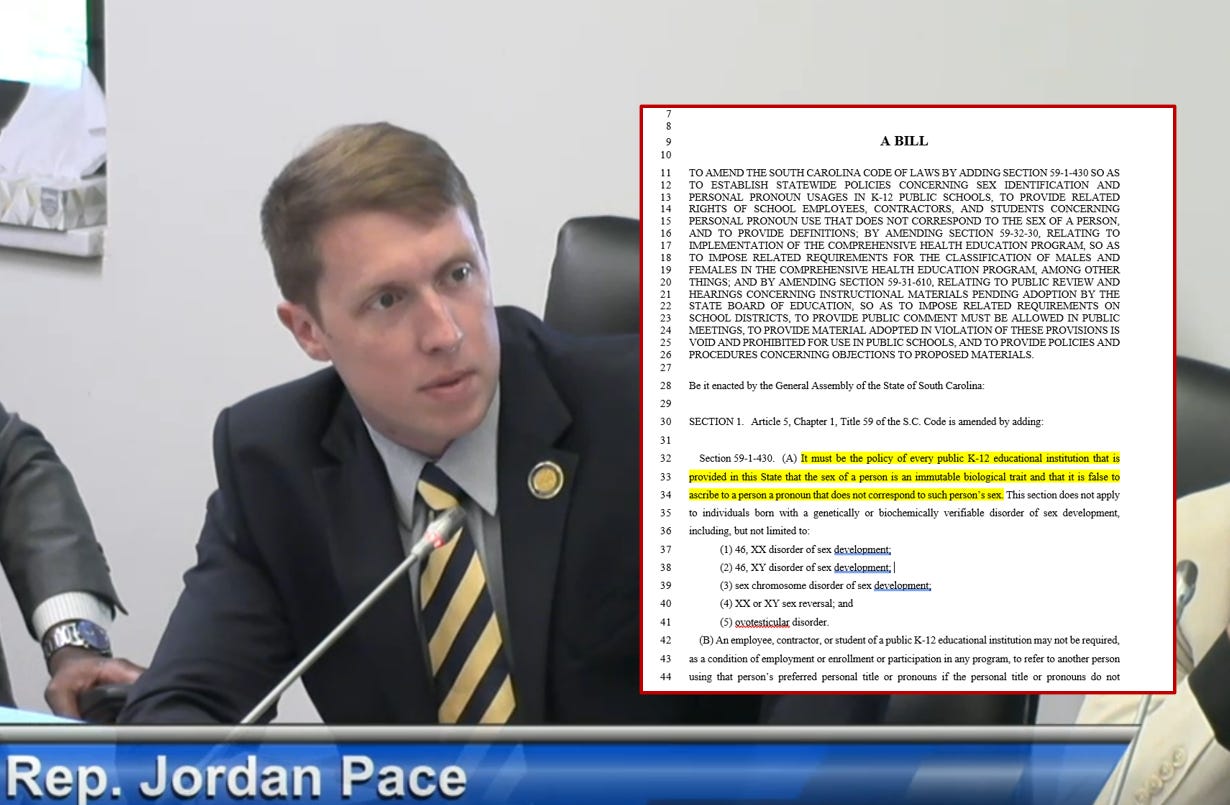
By Erin Reed | COLUMBIA, S.C. – A new bill in South Carolina would mandate schools to make it official policy that using a transgender person’s pronouns is “false.” The bill would also mandate that teachers could not go by their preferred pronouns or gendered honorifics if they do not match their assigned sex at birth.
Lastly, it would allow parents to more easily remove books from the classroom. When confronted with the effects this legislation would cause, Dr. Michael O’Brien, a pediatrician in the state, the bill’s sponsor, state Representative Jordan Pace (R-District 117), responded, telling Dr. O’Brien to “repent.”
The bill is House Bill 4707, and it is the latest in a slew of “Don’t Say Gay or Trans” laws. It closely mirrors other laws such as Florida’s most recent “Don’t Say Gay” expansion. That law also has a provision barring transgender teachers from going by their preferred pronouns. This resulted in at least one transgender teacher being fired in the state for using their honorific, and another transgender teacher being told she could no longer go by “Ms. Doe” and instead would have to go by “Mr. Doe” or “Teacher Doe.”
However, House Bill 4707 extends beyond Florida’s legislation. It requires every school to adopt the stance that “the sex of a person is an immutable biological trait” and that “it is false to ascribe to a person a pronoun that does not correspond to such person’s sex.” Essentially, it compels schools in South Carolina to teach or assert that disregarding a transgender person’s pronouns is the “appropriate” action and that using a transgender person’s pronouns is “wrong” or “false.”
See the provisions here:
The implications of this bill for transgender teachers and students in South Carolina are profound. Teachers would be forced to change their titles to those of their assigned sex at birth. Likewise, teachers would be forced to “out” themselves as transgender if they wished to stay in compliance with the law.
Moreover, students would receive instruction portraying transgender identity as “incorrect” or “false,” severely impacting transgender students’ well-being.
When responding to the bill, a local pediatrician, Dr. Michael O’Brien, offered the bill’s sponsor his insight into the bill, stating that it is a “cruel bill designed specifically to harm trans South Carolinians” and offering to discuss the bill with him.
Representative Pace responded by telling him that it is “cruel” to affirm transgender people and that instead, he should “repent” and hope that the “lord shows [him] mercy.”
This is not the first time Representative Pace has weaponized the powers of the state against transgender people. Previously, Representative Pace announced that his caucus successfully shut down the Medical University of South Carolina’s gender clinic for trans youth.
This came after the South Carolina Freedom Caucus, of which Pace is a member, threatened to strip funding from the hospital unless it shut the clinic down. The hospital acquiesced to legislative pressure and shut the clinic down in December 2022.
Bills like this are likely to proliferate in 2024. Florida’s first Don’t Say Gay law was passed in 16 states in the aftermath of its passage in Florida. Similarly, Florida’s bathroom ban on transgender adults has also been introduced in South Carolina.
Already, 89 bills have been filed for the 2023-2024 legislative session across the United States, and state legislatures have not even opened for 2024 yet. Meanwhile, the transgender community continues to endure an escalating series of legislative attacks.
****************************************************************************

Erin Reed is a transgender woman (she/her pronouns) and researcher who tracks anti-LGBTQ+ legislation around the world and helps people become better advocates for their queer family, friends, colleagues, and community. Reed also is a social media consultant and public speaker.
Follow her on Twitter (Link)
Website here: https://www.erininthemorning.com/
******************************************************************************************
The preceding article was first published at Erin In The Morning and is republished with permission.
South Carolina
Myrtle Beach SC area county govt nixes already issued Pride proclamation
The County Council’s decision highlighted the long-simmering tensions between conservative Christians and the LGBTQ community
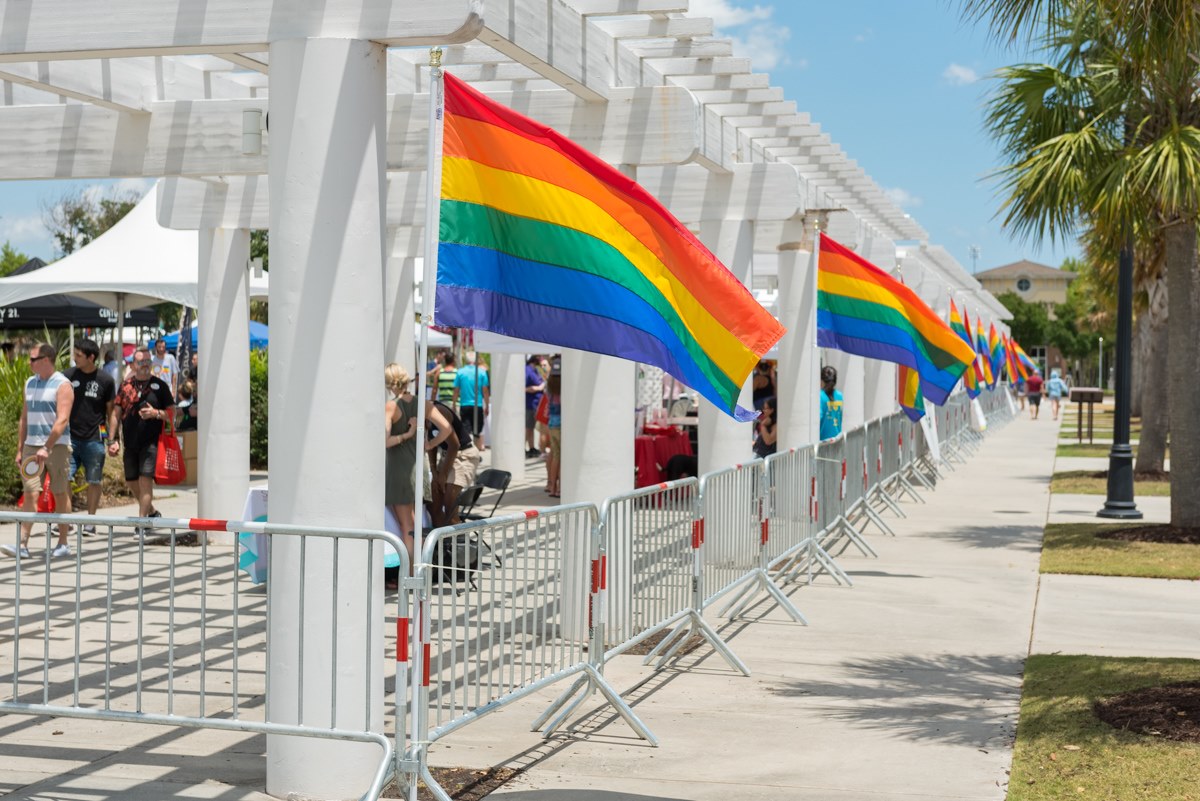
MYRTLE BEACH, Sc. – The seaside resort city of Myrtle Beach has long been a vacation destination for LGBTQ+ people in South Carolina, although its not considered an LGBTQ+ mecca its not intolerant either until recently.
A decade old survey by UCLA School of Law’s Williams Institute 2010, showed that the the highest density of gay couples in South Carolina lived in Myrtle Beach, which ranked the highest with 11.67 gay couples per 1,000 households.
This week though, according to the local Myrtle Beach Sun News, Horry County Council members on Tuesday did something highly unusual. They voted to nix a not-legally-binding resolution after having voted to approve it last month. That resolution? To declare June as Pride Month.
Under the headline of “Horry Republicans supported Pride Month, until they noticed. Where did council go wrong?” the paper noted that the County Council’s decision highlighted the long-simmering tensions between conservative Christians and the LGBTQ community.
The local LGBTQ advocacy group Grand Strand Pride was behind the resolution, organization leader Terry Livingston said, and local conservative pastors, like Rev. Mack Hutson, led an effort to nix the resolution.
“This news dampens our spirits but we resolve to make progress by continuing our advocacy work to make all of Horry County inclusive, diverse and equal for all,” Grand Strand Pride said in a statement Wednesday.
Rev. Mack Hutson who led the effort to have the proclamation revoked told the Sun-News in an interview:
“I don’t feel like the majority of the people of Horry County were very happy about our county putting a stamp of approval…on the month of June being declared gay pride month,” Hutson said. “Everybody I had talked to was totally against it. The gay community (are) not the only people who live in Horry County.”
“We had no idea and that’s our fault, we had no idea it was the LGBTQ (resolution),” council member Johnny Vaught told the paper adding:
“This is still the Bible Belt and there’s a lot of conservatives around here,” he said. “I have to serve the majority of my constituents and the majority of my constituency is saying we don’t want that.”
Reacting to the decision Rev. Hutson told the Sun-News he was pleased to see the council’s reversal. “I’m so proud of Horry County Council that they had enough backbone to do that,” he said.
South Carolina
SC man convicted under anti-sodomy law sues over sex offender status
Convicted before SCOTUS ruling Lawrence v. Texas making it illegal to criminalize private intimate relationships between consenting adults

COLUMBIA, Sc. – A South Carolina man forced to register as a sex offender for having consensual gay sex with another man in 2001 is suing the state over its “unconstitutional” anti-sodomy statute.
The man – identified as John Doe in the lawsuit filed by the American Civil Liberties Union (ACLU) of South Carolina and private attorney Matthew Strugar – was found guilty under the state’s anti-sodomy law, titled “buggery,” in 2001. As a result, he was forced to register as a sex offender, a status he holds today, even though he was pardoned in 2006, according to the complaint.
His conviction came before the U.S. Supreme Court’s landmark 2003 decision in Lawrence v. Texas that made it illegal to criminalize private intimate relationships between consenting adults.
Doe’s partner was also found guilty of the offense.
“South Carolina is the last state in the country to require sex offender registration for pre-Lawrence sodomy convictions,” said Allen Chaney, ACLU of South Carolina’s Legal Director. “This practice needlessly subjects law abiding citizens to the horrors of the sex offender registry and demonstrates a deeply troubling animosity by the State towards the gay community.”
The lawsuit, filed in the U.S. District Court for the District of South Carolina, argues that requiring Doe to register as a sex offender violates his Fourteenth Amendment rights to due process and equal protection under the law. It names South Carolina Attorney General Alan Wilson and Chief of the South Carolina Law Enforcement Division (SLED) Mark Keel as defendants.
Robert Kittle, spokesperson for the Attorney General’s Office, said Wilson did not have a comment on the pending litigation.
Doe is seeking to have his name, and the names of other people convicted under the law, removed from the registry. According to the lawsuit, at least 18 people in South Carolina are still forced to register as sex offenders because of the buggery law.
“It is unconscionable that in 2021, South Carolina would still put people convicted of having gay sex on the sex offender registry,” said Strugar. “This kind of overt, state-sanctioned homophobia would have been surprising 30 years ago. Today it is shocking. And it is unconstitutional.”
Doe’s lawyers write that a sex offender status “seriously restricts the public and personal lives of registrants,” adding that Doe “suffers severely under the sex offender label, which involves the state in the daily management of his life.”
Doe said he was denied a professional license recently, leading him to bring the lawsuit forward. In addition, Doe must report to the local sheriff’s office twice a year and report information that is “encyclopedic in scope,” according to the complaint.
“Doe suffers continuing harm because of the continued application of South Carolina’s Buggery statute,” the lawsuit alleges.
“This is wrong, violates well-established constitutional law, and must be stopped,” wrote the ACLU of South Carolina in a press release. “Being gay isn’t a crime, and having gay sex isn’t a sex offense. Enough is enough.”
South Carolina
South Carolina latest to join ‘ban the LGBTQ+ books’ effort by Republicans
Governor orders a comprehensive investigation into the presence of “obscene and pornographic materials in public schools in South Carolina”

COLUMBIA, Sc. – In what has turned into a nationwide effort by Republicans at the local and state levels to remove and ban LGBTQ+ themed books from public schools, labeling those books “pornographic,” joining in this week, South Carolina Governor Henry McMaster added his voice.
McMaster sent a letter to South Carolina Superintendent of Education Molly Spearman asking her to “begin a comprehensive investigation into the presence of obscene and pornographic materials in public schools in South Carolina.”
Today I wrote a letter to S.C. Superintendent of Education Molly Spearman to request that she immediately begin a comprehensive investigation into the presence of obscene and pornographic materials in public schools in South Carolina. pic.twitter.com/txQEmSltU1
— Gov. Henry McMaster (@henrymcmaster) November 10, 2021
In a follow-up tweet, the Governor added; “For sexually explicit materials of this nature to have ever been introduced or allowed in South Carolina’s schools, it is obvious that there is or was either a lack of, or a complete breakdown in, any existing oversight processes or the absence of appropriate screening standards.”
The Governor’s actions were preceded by outrage by conservative parents in the Fort Mill School District, (Officially known as York County School District 4). Parents had sent the Governor a copy of Gender Queer: A Memoir by Maia Kobabe, which is classified in the Comics & Graphic Novels > LGBT genre.
The book is written as an autobiographical look at author Maia Kobabe, who uses e/em/eir pronouns. The 2020 ALA Alex Award Winner has frank illustrations of oral sex and other sexual content, along with discussions related to pronouns, acceptance and hormone-blocking drugs.
Greenville, South Carolina NBC affiliate WYFF 4 reported Thursday that the Governor reacted saying, “We looked at what was sent to us and I was shocked,” he said. “I stand with the parents who, of course, are standing for their children and there is no place in South Carolina for these kinds of inappropriate materials to be presented to young people.”
The Greenville County School District tells WYFF News 4 that a copy of that book has been in one of its high school libraries since March. It had only been checked out once, said GCS spokesman Tim Waller.
Waller added that district personnel reviewed the book and removed it from inventory.
The South Carolina Department of Education said it doesn’t have a role in choosing library books.
“Each district has its own board policy for review and purchase of library and media center books. It is clear that in this particular instance, the (Fort Mill School District) failed to properly vet the book in question for adoption,” said Ryan Brown, chief communications officer for the South Carolina Department of Education. “We had already begun a review of district policies concerning local purchases texts after this incident occurred and will make recommendations for improvement.”
More Republican leaders try to ban books on race, LGBTQ issues https://t.co/aNnp9glhyL
— NPR Politics (@nprpolitics) November 13, 2021
The issue over LGBTQ+ themed books has become a lightening rod among conservatives. In Virginia, Spotsylvania County schools will have to begin removing books this week that contain “sexually explicit” material after the school board voted 6-0 to order the removal.
That directive comes after two parents raised concerns at a school board meeting about books available to students, particularly LGBTQ+ fiction.
In Texas, The Keller Independent School District had also removed — “Gender Queer: A Memoir” by Maia Kobabe, after multiple parents complained about its availability to students in one of that district’s high schools.
The Texas Education Agency was instructed in a letter Wednesday by Texas Republican Governor Greg Abbott to investigate “the availability of pornography” in the state’s public schools system and determine if criminal activity had occurred as a result.
The Governor’s order to investigate the alleged criminal activity comes two days after he had tasked state education officials to develop statewide standards preventing “pornography” and “other obscene content in Texas public schools,” citing two memoirs about LGBTQ+ characters which include graphic images and descriptions of sex the Texas Tribune reported.
-

 Viewpoint3 days ago
Viewpoint3 days agoI’m a queer Iranian Jew. Why I stand with Israel during this conflict
-

 Congress3 days ago
Congress3 days agoWhite House finds Calif. violated Title IX by allowing trans athletes in school sports
-

 Colombia5 days ago
Colombia5 days agoColombia avanza hacia la igualdad para personas trans
-

 News4 days ago
News4 days agoDrama unfolds for San Diego Pride ahead of festivities
-

 a&e features2 days ago
a&e features2 days agoLatina Turner comes to Bring It To Brunch
-

 Books1 day ago
Books1 day agoTwo new books on dining out LGBTQ-style
-

 Television2 days ago
Television2 days ago‘White Lotus,’ ‘Severance,’ ‘Andor’ lead Dorian TV Awards noms





